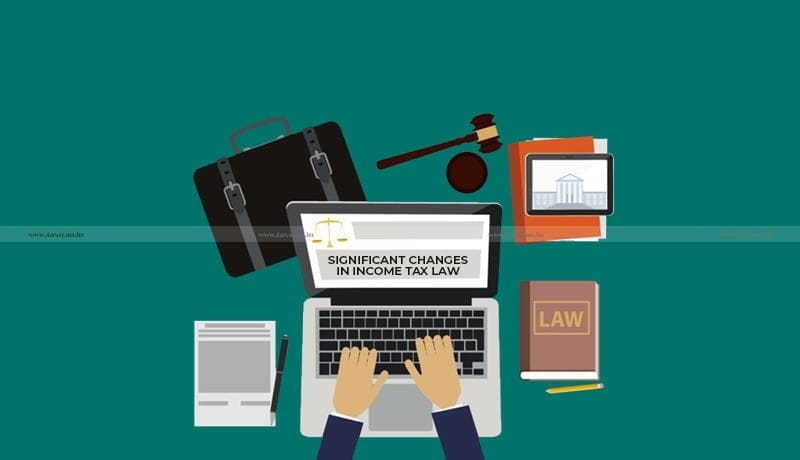Significant changes in Income Tax Law in the year 2021

The CBDT notified the deadline to link your Permanent Account Number with your Aadhaar number. The last date to link Permanent Account Number (PAN) with Aadhaar has been extended to June 30, 2021. As per the reports, the government may take a tough stand against those taxpayers who have not liked their PAN with Aadhaar. Moreover, the report further says that if an employee fails to link PAN with an Aadhaar card by June 30, the company will not credit their salary from the next month.
The Department has made the process of filing income tax returns (ITR) easier for the taxpayers by making available the Pre-filled Income Tax Return for some categories. The option of pre-filled ITR forms is available on the new website. Taxpayers will be able to proactively update their profile to provide certain details of income including salary, house property, business, or profession which will be used in pre-filling their ITR.
The Central Board of Direct Taxes (CBDT) chairman Pramod Chandra Mody said that the Budget provision that makes interest on employee contributions exceeding Rs.2.5 lakh a year to the Employees’ Provident Fund (EPF) taxable will also be applicable to all government employees covered by the General Provident Fund (GPF).
The Central Board of Direct Taxes ( CBDT ) issued the Circular regarding the use of functionality under Section 206AB and 206CCA of the Income Tax Act, 1961. The Finance Act, 2021 inserted two new sections 206AB and 206CCA in the Income Tax Act 1961 which takes effect from 1 day of July 2021. These sections mandate tax deduction (section 206AB) or tax collection (section 206CCA) at higher rate in case of certain non-filers (specified persons) with respect to tax deductions (other than under sections 192, 192A, 194B, 194BB, 194LBC and 194N) and tax collections. The higher rate is twice the prescribed rate or 5%, whichever is higher. A specified person means a person who satisfies both the two conditions.
Section 139 of the Income Tax Act governs the filing of income tax returns by every individual with income above the basic exemption limit. However, Union Budget 2021 in order to provide relief in terms of compliance burden for filing returns, exempted senior citizens above 75 years of age from filing the income tax return, subject to the various conditions.
The government has introduced an LTC/LTA cash voucher scheme to allow employees eligible for LTC/LTA to claim tax-exempt reimbursement of similar amounts subject to certain limits and spending conditions. This has been done as employees are unable to travel due to the coronavirus pandemic.
- EPF contribution
Interest on employee’s share of contribution to Employees' Provident Fund (EPF) on or after April 1, 2021, will be taxable at the stage of withdrawal if it exceeds ₹2.5 lakh in any year. This will lead to additional tax liability, especially for High Networth Individuals (HNIs) who make higher contributions, and will also discourage voluntary provident fund (VPF) contributions. This along with taxation of aggregate employer’s contributions in excess of ₹7.5 lakh to EPF, NPS, and superannuation fund and interest thereon introduced last year, may make EPF an even less attractive retirement scheme.
The government has extended the additional tax deduction of ₹1.5 lakh on interest paid on housing loans for the purchase of affordable homes by one more year to March 31, 2022. The additional deduction of Rs1.5 lakh over and above ₹2 lakh was introduced in the 2019 budget. This was allowed for those buying homes for the first time and of up to ₹45 lakh cost.
With effect from 1st April 2021 the Finance Bill, 2021 has inserted the new chapter namely Dispute Resolution Committee. The Central Government has consciously adopted a policy to make the processes under the Act, which require interface with the taxpayer, fully faceless. In this backdrop, new schemes for faceless assessment, for faceless appeal at the level of Commissioner (Appeals), and for the faceless imposition of penalty have already been made operational. Further, the Taxation and Other Laws (Relaxation and Amendment of Certain Provisions) Act, 2020 has empowered the Central Government to introduce similar schemes for other functions being performed by the income-tax authorities.
- Filing of Form 10-IE for opting new tax regime
For opting new tax regime for Individuals and HUFs as per section 115BAC of the Income Tax Act, the taxpayer would require to file Form 10-IE on or before the due date of filing of ITR u/s 139(1) of the Income Tax Act.
Support our journalism by subscribing to Taxscan AdFree. Follow us on Telegram for quick updates.


